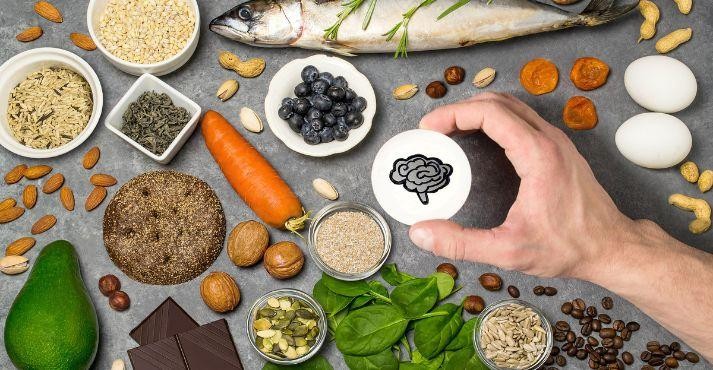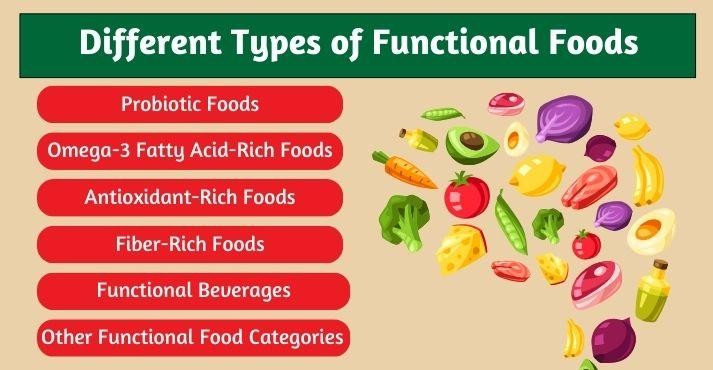Have you heard of foods that offer more than just nutrition? These foods are called functional foods, changing how we think about what we eat.
With a growing interest worldwide, people are turning to functional foods for more than their basic nutritional needs.
Functional foods are considered powerful tools in preventing diseases and boosting overall health. In Southeast Asia, where traditional foods have long been considered wellness sources, functional foods play an even bigger role in modern diets.
Consumers today are more aware of how food can impact health. With rising healthcare costs and an increasing focus on preventative health, functional foods offer a natural way to improve well-being.
They help with everything from improving digestion to strengthening immunity. But what exactly are functional foods, and how do they work?
What are Functional Foods?

Functional foods are foods that provide additional health benefits beyond basic nutrition. They are everyday foods packed with bioactive compounds like antioxidants, vitamins, and omega-3 fatty acids, which can promote health or help prevent certain diseases.
Unlike regular foods, functional foods are recognized for their ability to target specific health concerns, such as heart disease or digestive problems.
A typical example is yogurt, which contains probiotics that support gut health by balancing the bacteria in the digestive system.
Fortified foods, like cereals enriched with vitamins and minerals, are also considered functional foods because they provide more than just calories—they contribute to overall well-being.
The term nutraceuticals is closely related to functional foods. Nutraceuticals are products derived from food sources that provide health benefits and nutritional value.
For example, green tea, rich in bioactive compounds like catechins, is a nutraceutical because it provides powerful antioxidant benefits.
The use of nutraceuticals is growing across Southeast Asia, especially in countries like Singapore, where consumers are becoming more health-conscious.
Functional foods can also be modified through food processing to boost their health benefits. For example, CRISPR technology is being explored in food to increase the levels of bioactive compounds in crops, making them even more beneficial.
In addition, the food manufacturing and processing industries are actively exploring other technologies to develop functional foods further and make them a growing part of our daily diets.
Types of Functional Foods

Functional foods come in many forms and categories, each offering unique health benefits. Here’s a closer look at some of the main types:
1. Probiotic Foods
Probiotics are live bacteria that support gut health and digestion. Foods rich in probiotics include yogurt, kefir, miso, and fermented vegetables like kimchi and sauerkraut. Yakult, a popular probiotic drink in Southeast Asia, is commonly consumed for its gut health benefits.
Probiotics are essential because they help maintain a healthy balance of bacteria in the digestive system. This balance can boost immunity and aid in nutrient absorption.
Probiotic foods are also linked to reducing symptoms of digestive issues such as irritable bowel syndrome (IBS) and diarrhea. A study in Singapore highlighted the growing trend of consuming probiotic-rich beverages and snacks to support overall gut health.
2. Omega-3 Fatty Acid-Rich Foods
Omega-3 fatty acids are essential for heart health and play a key role in reducing inflammation and supporting brain function.
Foods like salmon, mackerel, chia seeds, and flaxseeds are rich in these healthy fats. Many people in Southeast Asia regularly consume fish, a great source of omega-3s. Fortified foods, such as omega-3-enriched eggs, are also becoming more common in the region.
Omega-3s are associated with lowering the risk of heart disease, stroke, and even depression. In Singapore and Malaysia, dietary guidelines emphasize the importance of incorporating omega-3-rich foods into meals for cardiovascular health.
3. Antioxidant-rich foods
Antioxidants help protect the body’s cells from damage caused by free radicals. This protection is essential for reducing the risk of chronic diseases such as cancer, heart disease, and premature aging.
Foods like blueberries, green tea, and dark chocolate are known for their high antioxidant content. In Southeast Asia, antioxidant-rich fruits like dragon fruit and guava are popular because they support cellular health.
Green tea, consumed widely across Asia, is celebrated for its antioxidant properties and potential to reduce cancer risk and boost brain function. A study in Japan found that regular green tea drinkers had a lower risk of heart disease and stroke.
4. Fiber-Rich Foods
Fiber is crucial for maintaining digestive health, lowering cholesterol levels, and regulating blood sugar. Whole grains, beans, lentils, and vegetables are excellent sources of dietary fiber.
In Southeast Asia, traditional diets often include fiber-rich staples such as brown rice, whole-grain noodles, and mung beans.
Fiber is beneficial for digestive health and plays a role in weight management by promoting a sense of fullness and reducing overall calorie intake. High-fiber diets are linked to lower risks of obesity, diabetes, and heart disease.
5. Functional Beverages
The market for functional beverages has exploded in recent years, with drinks like vitamin-enriched waters, teas, and probiotic smoothies gaining popularity.
Beverages like kombucha, a fermented tea rich in probiotics, are consumed for their gut health benefits. In Singapore and Thailand, functional beverages like herbal teas and energy-boosting drinks with added vitamins have become famous for their convenience and health benefits.
These beverages hydrate and offer targeted benefits, from boosting energy levels to improving immunity. Consumers are increasingly seeking ways to meet their nutritional needs through beverages offering more than just hydration.
6. Other Functional Food Categories
- Phytochemicals: These compounds, found in plants, have health-protective benefits. For example, flavonoids in green tea and polyphenols in red wine are known for their antioxidant properties.
- Prebiotics: These fibers feed the good bacteria in your gut. Foods rich in prebiotics include bananas, garlic, and onions, commonly consumed across Southeast Asia.
- Adaptogens: Natural substances like ginseng, a popular root in Southeast Asia, help the body adapt to stress and support overall energy and resilience.
Health Benefits of Functional Foods

The health benefits of functional foods extend far beyond essential nutrition. These foods promote well-being, prevent diseases, and even support mental health.
You can be looking to improve digestion, boost your immune system, or boost brain function; functional foods offer a natural and effective way to address various health concerns. Here’s a closer look at the essential health benefits that functional foods provide:
1. Improved Digestive Health
Digestive health is one of the most well-known benefits of functional foods. Probiotic- and fiber-rich foods work hand in hand to support a healthy digestive system. Probiotics are live bacteria found in foods like yogurt, kimchi, and sauerkraut.
They help maintain the balance of good bacteria in the gut, which is crucial for optimal digestion, nutrient absorption, and immune function.
- Probiotic-rich foods improve the gut microbiome and are linked to reduced inflammation and better digestion. This is especially important in Southeast Asia, where fermented foods are part of traditional diets.
- Probiotics also help alleviate digestive issues such as irritable bowel syndrome (IBS), diarrhea, and bloating. They are particularly beneficial after antibiotics, as they help restore the gut’s natural flora.
Conversely, fiber-rich foods, such as whole grains, legumes, fruits, and vegetables, promote regular bowel movements and prevent constipation.
Fiber increases the bulk of stools, making them easier to pass. Studies in Singapore show that diets high in fiber significantly reduce the risk of digestive disorders, including diverticulitis and colon cancer.
Furthermore, prebiotic fibers found in foods like bananas, onions, and garlic feed the good bacteria in the gut, further improving digestive health.
2. Enhanced Immune Function
A strong immune system is critical for overall health; certain functional foods can naturally boost immune function. Garlic, turmeric, and yogurt are well-known for their immune-boosting properties due to the bioactive compounds they contain.
- Garlic contains allicin, a sulfur compound with potent antimicrobial and anti-inflammatory effects. Allicin has been shown to help the body fight off infections, from the common cold to more serious illnesses.
- Turmeric, widely used in Southeast Asia, contains curcumin, an anti-inflammatory compound shown to improve the immune response. Curcumin is particularly effective at reducing inflammation, which plays a key role in many chronic diseases.
Incorporating these foods into your diet can help your body fight off infections and reduce inflammation. Many traditional Southeast Asian dishes already feature garlic and turmeric, making them an easy and natural way to support immune health.
Probiotic foods also support the immune system by improving the gut’s ability to fend off harmful pathogens, making functional foods a powerful ally for overall health.
3. Heart Health Benefits
Heart disease is one of the leading causes of death worldwide, and functional foods play a key role in promoting cardiovascular health. Foods rich in omega-3 fatty acids, such as salmon, mackerel, and flaxseeds, are linked to reduced risk of heart disease and stroke.
- Omega-3 fatty acids help lower bad cholesterol (LDL) levels while increasing good cholesterol (HDL) levels. These fatty acids also reduce inflammation in the arteries, significantly contributing to heart disease.
- Antioxidant-rich foods like berries and dark chocolate protect the heart by reducing oxidative stress. Antioxidants neutralize free radicals and unstable molecules that can cause damage to cells and tissues, reducing the risk of heart attacks and strokes.
In Southeast Asia, fish consumption is a regular part of the diet, providing a steady source of omega-3s. Additionally, incorporating antioxidant-rich fruits like dragon fruit and guava can promote heart health by improving blood circulation and reducing blood pressure.
4. Weight Management
Maintaining a healthy weight is essential for overall health, and functional foods can aid in weight management. High-fiber foods, such as whole grains, beans, and fruits like apples and pears, are particularly effective in helping people control their weight.
- Fiber promotes a feeling of fullness, which can help reduce overall calorie intake. This is important for preventing overeating, which often leads to weight gain.
- Additionally, fiber helps regulate blood sugar levels by slowing down the digestion of carbohydrates. This helps prevent insulin spikes and crashes, which can contribute to cravings and overeating.
In Southeast Asia, fiber-rich staples like brown rice and whole-grain noodles are popular choices that support weight management. High-fiber diets are linked to lower risks of obesity and reduced likelihood of developing type 2 diabetes.
- Prebiotic fibers, found in foods like bananas and onions, also play a role in weight control by feeding beneficial gut bacteria. These bacteria help regulate appetite and fat storage, further managing weight.
5. Other Potential Benefits
Functional foods are also known to affect cognitive function and mood positively. For instance, omega-3 fatty acids are essential for brain health and are linked to improved memory and cognitive function.
- Omega-3s support brain cell structure and function, which can help prevent cognitive decline and reduce the risk of conditions like Alzheimer’s disease. These fatty acids also play a role in mood regulation, with some studies showing that omega-3 supplements can help reduce symptoms of depression and anxiety.
- Antioxidants in foods like blueberries help protect the brain from oxidative stress and inflammation, contributing to cognitive decline. Regularly consuming antioxidant-rich foods has been linked to better memory and learning abilities.
Additionally, adaptogens like ginseng, commonly used in Southeast Asia, help the body adapt to stress and improve mental clarity. Ginseng has been shown to reduce fatigue and boost cognitive function, making it a popular supplement for improving overall mental well-being.
Regulation of Functional Foods
Functional foods are subject to stringent regulations to ensure their safety, quality, and effectiveness. These regulations vary across regions, but they generally aim to protect consumers by ensuring that functional foods are safe to consume and provide the health benefits they claim.
Many countries in Southeast Asia have established specific guidelines to regulate the development, marketing, and sale of functional foods.
For instance, the SFA (Formerly Agri-Food and Veterinary Authority) regulates functional foods in Singapore. The SFA requires companies to meet strict standards before any product can be marketed as providing health benefits.
These regulations ensure that functional foods are accurate and offer the promised benefits. Manufacturers must provide robust scientific evidence, including clinical trials, to support health claims on their products.
In addition, labeling requirements are enforced to make sure consumers are well-informed. For example, ingredients like bioactive compounds must be clearly stated on product packaging, with detailed information on how these compounds contribute to health.
Southeast Asian regulations are designed to protect consumers from false advertising, ensuring that the growing functional food market remains credible and that products meet high safety and efficacy standards.
Future Trends in Functional Foods
Innovations in Food Technology
Exploring the future of functional foods, let’s delve into the intriguing domain of innovations in food technology. These advancements promise to reshape our nutritional landscape, introducing novel functional foods with unparalleled health benefits.
1. Revolutionizing Food Technology:
The future of functional foods is closely connected with pioneering innovations in food technology. Imagine a blend of scientific breakthroughs and technological wonders shaping a new era in nutrition.
From precision engineering to novel processing methods, the tools of tomorrow are poised to revolutionize how we perceive and consume functional foods.
2. Advancements in Functional Food Science:
As we explore the future, expect a convergence of health-promoting innovations in functional food science chemistry.
Researchers and scientists are on an exploration to unravel the full potential of nutrients, bioactive compounds, and their synergistic effects. It represents an engaging exploration that holds the potential to enhance the health benefits ingrained in our daily meals.
3. Personalized Nutrition Frontiers:
The future of functional foods is personalized. Imagine a scenario where your dietary choices are tailored to your unique genetic makeup, lifestyle, and health goals.
This is the frontier of personalized nutrition, where functional foods become not just a generic source of nutrition but a meticulously crafted regimen that aligns perfectly with your needs.
4. Bioactive Compounds Reimagined:
Bioactive compounds take center stage in the future narrative of functional foods. Researchers are exploring new sources, novel combinations, and innovative delivery mechanisms to enhance the bioavailability of these compounds.
The aim is to unlock their full potential in promoting health and preventing diseases.
5. Smart Packaging and Delivery Systems:
The future isn’t just about what’s inside the food; it’s also about how it reaches you. Innovative food packaging and delivery systems are emerging as critical players in ensuring the freshness, quality, and even the timed release of nutrients in functional foods.
It’s an integration of technology in food industry to optimize the consumer experience.
6. Functional Foods Beyond Nutrients:
Moving beyond traditional nutrients, the future of functional foods envisions a broader spectrum of health benefits. From mood-enhancing compounds to ingredients supporting metabolic health, these foods become holistic allies in our well-being journey.
7. Sustainable Functional Foods:
Sustainability takes center stage in the future trends of functional foods. Innovations in sourcing, production, and recyclable food packaging aim to create foods that nourish our bodies and the planet. It’s a conscious effort to harmonize health and environmental well-being.
8. Elevating Culinary Experiences:
Future functional foods are not just about health but culinary delight. Expect an array of foods that support your health goals and tantalize your taste buds. It’s a fusion of health and culinary expertise that transforms every meal into a delightful experience.
Conclusion
Functional foods are more than just a trend—they are a way to improve health and prevent diseases through daily diet.
Now that we know what functional foods are, we must also understand that individuals can significantly boost their overall well-being by incorporating foods rich in probiotics, omega-3s, antioxidants, and fiber.
As more people become aware of the benefits of functional foods, their presence in the market will continue to grow, especially in regions like Southeast Asia.
Whether for heart health, digestion, or immune support, functional foods play a vital role in maintaining a healthy lifestyle.














